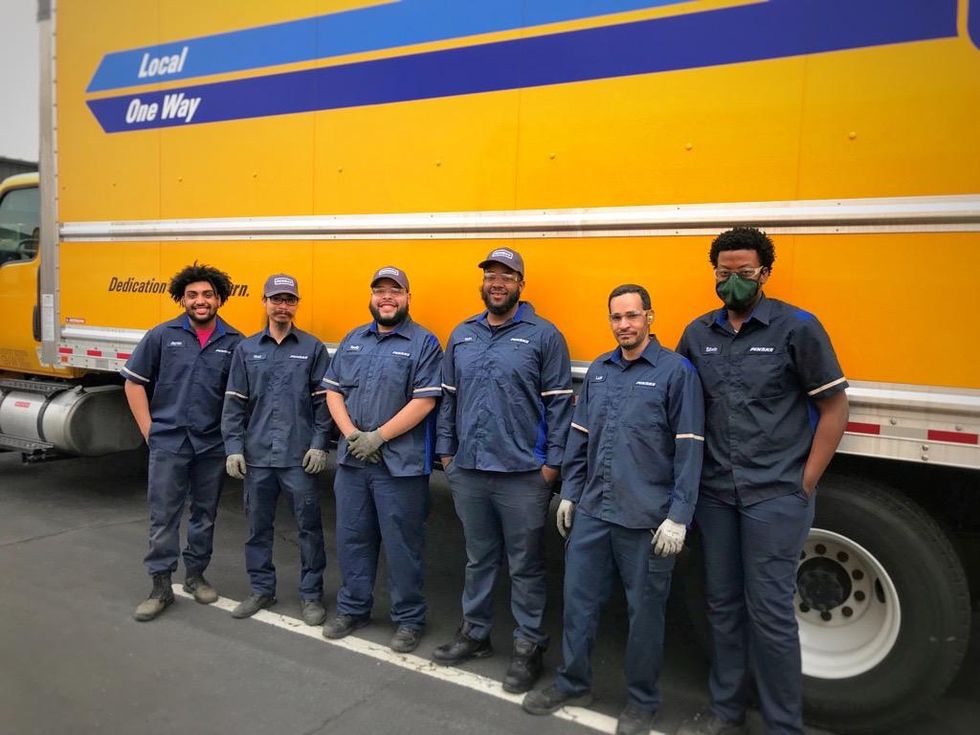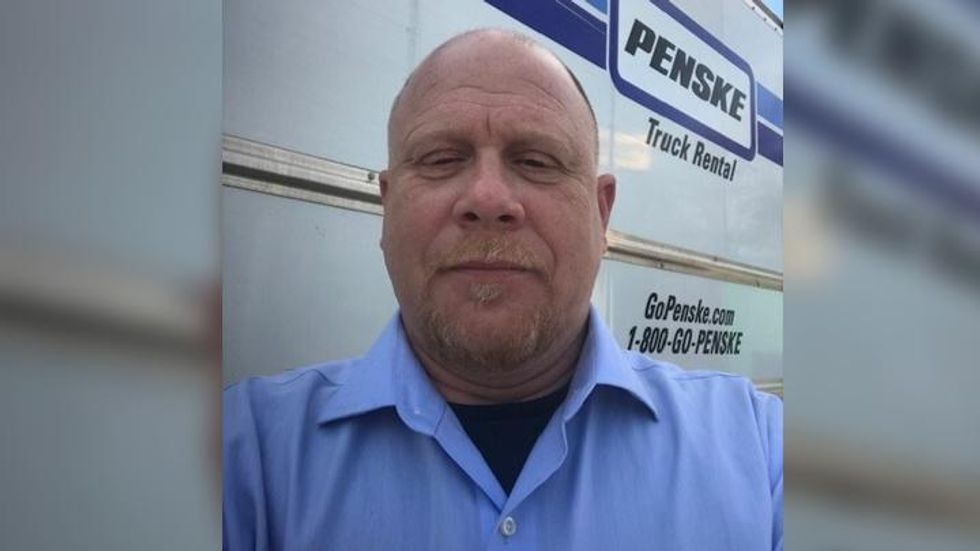Penske Collision Repair
September 09, 2025

A collision of any kind can create a stressful situation for fleets. Lost time, repair costs and quality are all concerns, and choosing the right collision repair facility is critical to minimizing downtime and ensuring the integrity and safety of equipment. Not all repair centers are created equal, especially when it comes to heavy-duty vehicles like Class 8 trucks.
Here are expert tips for selecting a reputable commercial truck collision repair facility:
Seek out commercial vehicle specialists: Unlike passenger vehicles, commercial trucks require specialized expertise and equipment. Verify that the repair center is equipped and certified to handle the size, weight and structural complexity of commercial vehicles.
Look for accurate, transparent estimates: A trustworthy repair provider should offer accurate estimates that include detailed photos. The estimates should also be based on industry data and generated by accredited third-party estimation software. Having precise estimates with supporting photos ensures transparency and helps fleets avoid unexpected costs.
Demand strong repair cycle times: For commercial vehicles, getting equipment up and running quickly is essential. A reputable facility understands the importance of repair cycle time and works efficiently to get equipment back on the road without compromising quality.
Ask about replacement vehicles: Commercial vehicles are essential business tools, and being without them can result in significant disruptions to a business. If a vehicle is experiencing downtime, the ability to get a replacement vehicle can keep freight moving.
Confirm they work with insurance providers: Whether a fleet is self-insured or uses a major insurance carrier, it's important to work with a collision repair provider that can navigate a variety of insurance arrangements. From documentation to direct billing, experienced facilities know how to manage claims and streamline the process.
Look for 24/7 support: Accidents aren’t planned and don’t always happen during standard business hours. Providers that offer round-the-clock support, including after-hours intake and towing services, allow fleets to get the help they need no matter when a collision happens.
Be certain strong communication is a priority: Clear, consistent updates are key during the repair process. A reputable shop will prioritize communication, provide regular progress reports and be responsive to questions. Poor communication can lead to delays, misunderstandings and increased costs.
Understand the value of a nationwide presence: Fleets that operate in multiple states should consider national repair networks. A provider with locations throughout the country offers convenient, consistent service standards and peace of mind if repairs are needed far from a fleet’s home base.
Make sure they handle complex repairs: The ability to complete the repair regardless of complexity is an important item that a consumer of collision repair should look for. Providers that understand vehicle complexity, especially as it relates to ADAS technology and calibration of the equipment, are important.
Vehicle-specific expertise matters: Commercial trucks vary widely by make and model. A repair shop familiar with specific brands, such as Freightliner, Volvo or International, will be better equipped to work on the equipment, perform precise repairs and secure parts quickly.
Evaluate their parts supply chain: A repair shop is only as efficient as its supply chain. Ask if they have consistent access to genuine OEM parts, paint, tools and specialized equipment needed for commercial vehicle repairs. Facilities that can’t source parts quickly are more likely to experience delays.
Test the waters with smaller jobs: Consider building a relationship with a repair center before a major collision occurs. Start small with planned minor bodywork or decal application to assess their performance, communication and turnaround time. This allows you to gauge their capabilities without the pressure of a major repair.
With 65 locations across North America, Penske Collision Repair specializes in medium- and heavy-duty commercial vehicle repairs. Facilities are equipped for comprehensive collision services, offer nationwide 24/7 support and focus on keeping fleets moving with minimal downtime.
Branding commercial trucks and trailers can make equipment stand out, increase brand visibility and reinforce a fleet’s market presence. There are several ways fleets can ensure their name, logo and identity are prominently displayed on equipment, whether it is leased, rented or owned.
One of the most effective ways trucking companies can brand their equipment is through decals, graphics and lettering. Options can include full wraps to cover the entire surface of the truck, or decals and lettering to focus on key branding areas, such as the cab doors, cargo box, air deflector, rear door and more.
Penske Collision Repair has several locations across the country that offer professional decaling services, applying or reapplying custom decals to ensure consistency across the fleet. Trained technicians use high-quality materials and precise application techniques to ensure decals are durable, weather-resistant and good-looking.
A consistent color scheme can make a fleet look cohesive and professional. Consistent use of color builds familiarity and strengthens the company’s presence on the road. From simple paint jobs to precise color matching, Penske’s certified technicians can professionally refinish a Penske truck or owned equipment so the trucks will match the rest of the fleet’s equipment with the exact custom paint color.
Penske Collision Repair centers are PPG paint certified. Penske and PPG back the paint and work with a performance warranty that provides extended protection. PPG is a global supplier of paints and coatings for transportation and other industries.
Magnetic signs offer a flexible and cost-effective branding solution for trucking companies. These signs can be easily applied and removed for a temporary yet professional-looking solution. They don’t offer the same high-impact visibility as custom-painted or professional decals but can allow companies to switch out branding quickly for different clients, campaigns or seasonal promotions without permanent alterations.
To learn more about options for branding your equipment, contact us today.
Thanks for visiting Fleet Refinishing, your partner in collision and repair services, specializing in high-quality refinishing for commercial vehicles.
For over 50 years, Penske has been a one-stop shop specializing in repairing commercial vehicles of all sizes while protecting your image and vehicle value. We offer direct correspondence with all insurance carriers and rental vehicles when needed. You also get:
Fleets are using technology to improve truck driver safety and shape driver habits. Onboard safety technology improves safety and can increase efficiency, reduce liability and cut costs — but fleets need to gain driver acceptance of any new solutions.
“The important thing is to communicate, communicate, communicate with drivers. Tell them new technology is coming. Have meetings about it. Then have one-on-one conversations,” said Chuck Pagesy, director of safety for Penske Truck Leasing. “Tell them the benefits and how it can help them.”
More and more companies are embracing adaptive cruise control, brake assistance, collision avoidance and onboard cameras, which means many drivers are becoming more comfortable with the technologies.
“In the beginning, if drivers didn’t like it, they could quit and go to a company that didn’t have it,” Pagesy said. “Most of your top fleets now have the forward-facing and driver-facing cameras.”
Even still, he suggests fleets take a gentle approach when introducing new technology or welcoming a new hire who isn’t as familiar with it. “After you explain it, you want to coach drivers so they understand what they’re doing wrong while ensuring frustration does not set in,” Pagesy said.
Having specific data available can help fleets create customized safe driver tips and improvement plans. “Most people change their behavior quickly because they want to be good, safe drivers,” Pagesy said.
He said it is vital for fleets to emphasize benefits, particularly with cameras, which can concern some drivers. “It will make them better drivers, and in the event of an accident, it will document it, which can exonerate them,” he said.
Fleets can also share examples of situations where truck cameras benefited drivers. The American Transportation Research Institute’s study Issues and Opportunities with Driver-Facing Cameras found that overall driver approval of driver-facing cameras increased by 87% when carriers used video footage for specific proactive safety measures.
ATRI said cameras can help professional drivers defend themselves. “According to surveys of legal and insurance experts, driver-facing camera footage, when available, exonerates drivers in 52% of insurance claims and 49% of litigation cases, as well as leading to settlements in 86% of cases versus proceeding to trial,” ATRI wrote in the study.
According to ATRI’s study, drivers currently using road-facing cameras gave them a high overall approval rating of 8.19 on a 10-point scale, which was 266% higher than the approval rating they give driver-facing cameras.
Drivers offered several suggestions to help increase acceptance of driver-facing cameras, including turning the camera off when the truck was not moving, ending punitive use and only showing video footage after an accident.
With any onboard safety technology that fleets deploy, those within the company need to ensure they’re monitoring it and using it for corrective counseling. “My big concern is that if you’re going to invest in safety technology, you better make sure your supervisors and dispatchers are looking at the data and using it,” Pagesy said. “If you’re not going to look at the data, my recommendation is not to get the system.”
Any former student knows that the months leading up to graduation can be just as daunting as they are exciting. On one hand, there is the pride and relief that floods in as the finish line appears; on the other, there is a looming sense of time ticking down as the job search begins. Add to that the pressure of finding your way in a brand-new career path, and the whole time period can quickly become very overwhelming. Penske collision repair centers are on a mission to change that.
Together with technical schools like Lincoln Tech, Penske’s apprentice initiative is fostering the next generation of technicians. Interested students work part-time at Penske collision repair centers during their downtime from class, boosting their studies and setting them up for success upon graduation.
“Apprenticeship gives students the time to grow without worrying about learning everything all at once. Once they graduate, they hit the ground as a full-time technician in our shop," explained Paul Townes, Body Shop Manager at Fairless Hills, Pennsylvania.
To date, Townes has had six apprentices come through his location, and all six have grown their careers with Penske. Because tech school curriculums cannot fully encompass the specialized tools or training needed for work in heavy duty collision repair, a huge part of these students’ success is the support they find at Penske. As Townes says, “the whole shop comes together to develop and support the apprentices.”

Michael Greene, Body Shop Manager at Annapolis Junction, Maryland, speaks to the strong sense of community and “environment of acceptance” he’s also experienced at Penske.
“I couldn’t be more grateful for how team-oriented we are here. Since the students lack experience, when I interview candidates, I focus on attitude and finding a good fit for my team," Greene said. "We leverage our other techs and supervisors for training; the whole team reassures them and rids them of any fear as they learn and grow. Most of our technicians started out the same way, so they are eager to pay it forward.”

For many tech school students, becoming a successful technician is their ultimate career goal. For those individuals, Penske’s apprentice initiative puts them on a fast-track to actualizing their dreams. For others like Body Shop Manager Robin Coto, being a technician is only one step in a long and varied career in the industry. For Coto, what started as a love for collision repair developed into a series of promotions and career jumps he’d never imagined – including hiring his Houston South, Texas, shop's first apprentices.
“I knew from the beginning that I wanted to grow with the company, but I never thought that I’d be where I’m at now. I would do it all over again – go to technical school and start out at the bottom," Coto said. "The opportunity to grow into the positions I’ve held and to learn everything that I’ve learned has proven invaluable. I didn’t think I’d make it this far, and that’s very exciting for all the new apprentices coming in: when they look at me, they can see that there’s always room to grow at Penske.”
Townes, whose first job out of college was as a management trainee with Penske Truck Rental, has a similar story of growth. He sees it echoed in his shop’s apprentices.
“For some of these kids, we’re the first body shop to give them a chance. It’s part of the Penske culture – look at my career or anyone else’s here – we’re not hiring lead technicians or looking for people who already know everything," Townes said. "We want to grow talent from within. I tell these students, ‘we’ll do everything we can to see you succeed because we’re a team and your growth helps us grow.’”

While developing new talent is a big undertaking, Penske associates aren’t afraid to put in the extra effort. Greene speaks to the long-lasting advantages of fostering new and aspiring technicians.
“The individuals coming in aren’t starting with any bad habits from previous shops, so we’re able to develop them in the right direction using the proper methods," Greene explained. "We never take short-cuts that could lessen the quality of repairs. It is rewarding because you see how hard work pays off – both on our end and theirs.”
Reward is a common thread for everyone involved in these apprenticeship initiatives. Robin, who grew up in an economically disadvantaged area, shares just how personally meaningful his role is in these students’ lives.
“From growing up where I did to being able to get where I’ve gotten at Penske... I just think about how many other kids don’t have the money or the means to go to a four-year college and instead go the technical school route," Coto said. "You can make a very good living working in a Penske collision repair center, so for me to be able to go into these schools and offer someone the opportunity to start a lifelong career with us is incredibly rewarding for me.”
Penske is always looking for talented individuals to join our team. View our current list of job openings here.
By Sarah Althen
At this time the Penske website requires that you enable JavaScript in order to take advantage of our website features. Please enable JavaScript and retry.
For assistance with other Penske services, please use the numbers below.
Truck Rental
Used Trucks
Truck Leasing
Penske Logistics